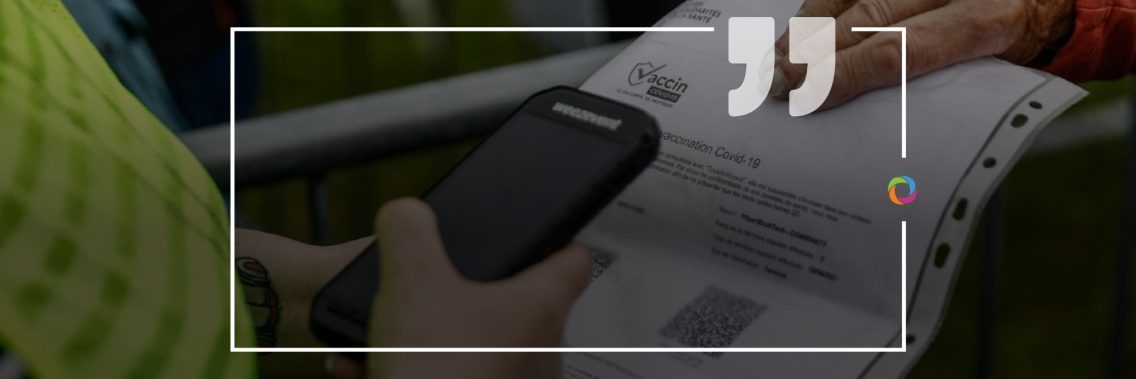If, before the pandemic, all you needed to get into a restaurant was to have some money, nowadays there is much more involved than that. A wave of companies and governments are announcing new vaccine policies that require people to be inoculated against COVID-19 in order to keep their jobs, go to the office, dine in restaurants or attend indoor performances. This raises the question: do vaccine passes discriminate against the unvaccinated? Let’s see what human rights experts have to say about this.
Do vaccine passes discriminate against the unvaccinated? Please argue your position.

“Initially we were concerned about the accessibility and availability of vaccines and how the requirement of a vaccine pass would affect the poor nations. The reality on the ground and what we are seeing now is that countries like Israel that are reported to have high vaccination rates are also reported to have more COVID-19 cases in September of 2021than ever before. What this tells us is that we are in a trial-and-error period and any measure being used to tackle the further spread of COVID-19 should be reflective of this. A government that has open borders and allows travelers into its country cannot house a company requiring people to be inoculated to keep their jobs etc. The requirements must be consistent, we all know the reassurance that consistency brings over time. Inconsistencies in vaccine policies breed rejection and contempt of any efforts. At this point in time, I doubt any of us can really say with a minimal degree of certainty what is working and what is not, but we need to harness our efforts to devise new ways to live with the new normal through trial and error.”

“Reading public sources on the internet about collective movements and individual positions against vaccination, I understand some points: regarding people from the USA, Canada, Europe, and Latin America, the majority of those against the COVID-19 vaccine would have had, at least, the standard vaccines when they were kids, although they say they don’t trust the vaccines for COVID-19. The anti-vaccine position seems to rely on confusing media information and one-sided reports making some people feel anxious and insecure about the entire pandemic situation. For instance, some have concerns about the safety of the COVID-19 vaccine. An increased number of individuals see vaccination as a violation of individual civil liberties and do not see the value of granting collective rights to prevent health impacts. Equally, it is not clear how the anti-vaccine individuals see the potential increase in others’ exposure to health risks due to their choice or conduct (against vaccination). In principle, everybody has the fundamental right to take sides, freely state their beliefs and fears, or even be misinformed. Having stated that, I favour listening to their reasons, promoting engagement in a balanced fashion, and establishing a common ground discussion opening space to convey that all lives equally matters. Nobody has a fundamental right to pose a risk to others’ health and life. Currently, massive vaccination is the only line of defence against deadly diseases. Regarding the question (whether the vaccine passes discriminate against unvaccinated), the discrimination just relies on the unbalanced global distribution of the vaccine. Whether access to the free-of-charge vaccine is available to all, in my opinion, it does not discriminate. It follows the logic of the 20th-century flow of massive vaccination: prevention of diseases, human suffering, health care costs, and death.”

“Vaccine passes do not discriminate against the unvaccinated. In fact, the question should be: why are vaccinated people being asked to once again pander to unvaccinated people, a minority in societies that are science-based. Given that in most societies the majority will be vaccinated, the unvaccinated pose a health risk and should be managed as such.”

“In my opinion, it can be a pretext for discriminatory measures in certain circumstances. I consider it discriminatory because I’m aware of the basic principle to make decisions about our bodies as a basic human and universal right. It seems to me that the overwhelming trend of media information campaigns that fall on our ears every single day and the authoritarian measures that some governments have implemented to try to eradicate COVID-19 inhibits the basic principle of making decisions about our bodies. I’m against vaccination passes in certain circumstances because it seems to me this would be the perfect pretext to apply it so soon only to certain groups of people, for example, the borders that divide the First World and the Third World, which shows that these measures can become an opportunistic pretext for certain governments to finally carry out their discriminatory anti-immigrant policies. What is happening on the Mexican-American border is a clear example of that. Even the mayor of Boston, Kim Janey, has compared vaccine passports with slavery freedom papers. The lack of privileges that travel entails today will make hundreds of thousands of displaced people suffer the deepening of the discriminatory policy of “show me your papers” around the world. I just want to point out that more attention must be paid to these measures because, in certain circumstances, either due to the most conservative governments and the symbolic violence towards the most vulnerable groups like migrants, these vaccination passports can be reflected in discriminatory measures.”
Check out more than 300 job opportunities in the Human Rights sector here.

